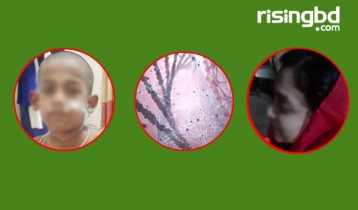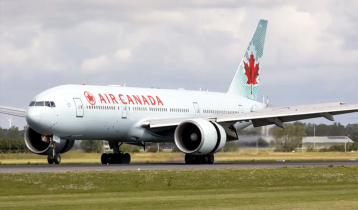10 symptoms of pneumonia
8 || risingbd.com

Pneumonia is a pulmonary condition that causes inflammation of the air sacs in the lungs.
Infection from viruses and bacteria, certain drugs, and chemicals that irritate the lungs are all potential causes. Pneumonia can affect just about anyone, from infants and children to adults and the elderly. Depending on the cause of the infection, pneumonia can be treated effectively -- as long as the individual receives a diagnosis in time. Anyone experiencing multiple symptoms of pneumonia should seek medical advice and begin treatment.
1. Fever
Most people with pneumonia suffer from fever at some point during their illness. The fever may be mild or high, depending on which germ is responsible for pneumonia. If the fever is mild, over-the-counter medication may be enough to provide relief. In milder cases, it may take two to three days for fever to subside, even with medication. A fever of more than 102 degrees Fahrenheit should prompt a visit to the doctor.
2. Chills
Those who have a temperature due to pneumonia may also have chills. In cases where the infection is severe, and the fever is high, the chills can produce an almost violent shuddering. However, with quick intervention with medication, the shaking chills are among the first symptoms to disappear. Even so, fever accompanied by chills indicates that the infection is more severe.
3. A cough
Another classic symptom of pneumonia is a cough, which may or may not be dry (not producing phlegm). In most cases, coughing is the earliest sign of the condition and can last for several days after a course of medication is complete. Sometimes, where phlegm is present, the individual may cough up yellowish or green mucus. In severe cases, people may even cough up blood, which indicates an urgent need to seek medical assistance. If a cough is mild or moderate, sufferers should avoid cough medicines, which can decrease the mucus removal that coughing promotes.
4. Labored Breathing
Many people with pneumonia experience breathlessness. Many times, this symptom causes the condition to be misdiagnosed as bronchitis, which produces similar signs but requires different treatment. When the shortness of breath doesn't go away with these treatments, the doctor may recommend a chest x-ray, one of the few tests that distinguishes pneumonia from bronchitis.
5. Chest Pain
Some people with pneumonia experience chest pain. It usually occurs as sharp, stabbing pain or a dull ache when inhaling or exhaling. Inflammation is the most common cause of this unpleasant symptom. As the infection spreads, it can make breathing difficult and cause chest tightness or difficulty breathing. Most often, this symptom affects only one side of the chest or the other, depending on the site of the infection.
6. Body Aches
Many people complain of physical aches after contracting pneumonia. Some develop muscle pain, while others experience stiffness in their joints. The exact relationship between these aches and pneumonia is unclear despite the commonness of the symptoms. Over-the-counter painkillers can relieve these aches, but individuals should discuss options with their physician before self-medicating.
7. Bluish Skin
In severe pneumonia cases, certain areas of skin may begin to turn blue. Usually, the lips or fingertips first become discolored. This is a sign of a medical emergency -- it indicates a severe lack of oxygen supply in the blood and that the infection has begun to interfere with vital bodily functions. If not treated, the results could be fatal. When pneumonia occurs in infants, this risk is increased. Babies suffering from pneumonia must be carefully observed for this symptom.
8. Nausea and Vomiting
In some instances, people with this condition may also suffer from nausea, which may or may not lead to vomiting. Though this is not a classic symptom, it does occur and may confuse a diagnosis. Researchers aren't certain why pneumonia causes nausea. However, if nausea or vomiting continues, individuals should report this symptom to their doctor.
9. Diarrhea
As with nausea and vomiting, diarrhea is a less typical symptom that occurs in only some infected patients. In most people with diarrhea associated with pneumonia, this symptom subsides gradually during treatment. If there is diarrhea or vomiting, the risk of dehydration increases and medical attention is imperative. People should not self-medicate in these instances; visiting the doctor as soon as possible is the right course of action.
10. Confusion, Fatigue, Malaise
When individuals develop pneumonia, their immune systems work overtime to contain and eliminate the infection. This over-stimulation can cause fatigue and lack of energy. Some people with severe pneumonia also experience confusion, especially in conjunction with a high fever. It's important to seek medical attention if this happens. As the infection decreases, these symptoms gradually fade as well. Full recovery can take a few weeks, however.
Agencies
Dhaka/Nasim
risingbd.com























